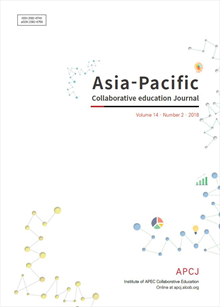간행물
Asia-Pacific Collaborative education Journal

- 발행기관 APEC국제교육협력원
- 자료유형 학술지
- 간기 반년간
- ISSN 2092-674X (Print)2092-6758 (Online)
- 수록기간 2004 ~ 2021
- 주제분류 사회과학 > 교육학 사회과학 분류의 다른 간행물
- 십진분류KDC 371DDC 379
권호리스트/논문검색
Volume 13 Number 2 (2017년 12월) 4건
1.
2017.12
구독 인증기관 무료, 개인회원 유료
Education is undoubtedly the greatest instrument which man has devised for his own progress. All societies have one form of education or another but the use to which it is put varies. This study investigated study habits, academic locus of control and self-efficacy as correlates of academic achievement among undergraduate students of the University of Lagos, Nigeria. A descriptive research survey was utilised for the study. The sample consisted of 524 undergraduate students selected from five faculties through proportional stratified random sampling technique. Three research questions and corresponding hypotheses were tested at .05 significant level while data were generated using standardized psychological tests which are Internal Control Index (ICI), Self-Efficacy Scale (SES), Study Habit Inventory (SHI) and Cumulative Grade point Average (CGPA) of the participants. Pearson Product Moment Correlation Coefficient Statistics was used to analyse the data. Results obtained showed a significant relationship between study habits, locus of control, self-efficacy and academic achievement among undergraduate students of the University of Lagos, Nigeria. It was recommended that parents, lecturers and the stakeholders on the campus and in the society at large should empower the undergraduate students to match both external and internal locus of control by self-efficacy, competence and effective study habits to achieve their academic goals.
4,000원
2.
2017.12
구독 인증기관 무료, 개인회원 유료
Fernández Morales, Cecilia, Iriarte Gómez, Fernando, Mejía Solano, Carmen, Revuelta Domínguez, Francisco Ignacio
In Peru, according to the Census of Students (ECE) carried out by the Ministry of Education at 2016 (MINEDU), there are sustained differences between learning goals in rural and urban schools. There are more than 20 thousand educational robotic kits distributed nationwide. It requires trained teachers to develop their digital competence and integrate these resources into the teaching-learning process. In this context, a virtual course was designed and executed, showing rural teachers how to plan learning sessions that integrate Information and Communication Technologies (ICT) in their pedagogical practice. The course was validated with 2500 registered teachers. In the first court, 300 did not log into the virtual classroom, 500 did not to complete the course, 1170 remained active, 534 successfully completed the course and 473 gained a certificate through the virtual platform. In the second court, there are 667-registered teachers. The conclusions of the experience indicate that it is possible to implement strategies for electronic learning aimed at rural teachers in a sustainable and cost - effective way using ICT, which spontaneously create virtual communities of collaborative learning, which support the process allowing implementation the "Knowledge Management". This experience will allow us to make recommendations for rural education policy in Peru (Fernández Morales, Iriarte Gómez, Mejía Solano, & Revuelta Domínguez, 2017).
4,500원
3.
2017.12
구독 인증기관 무료, 개인회원 유료
4,000원
4.
2017.12
구독 인증기관 무료, 개인회원 유료
Education reform is being deployed in Vietnam in the direction of developing learner’s competencies in which integrated teaching is viewed as a practical, effective way to achieve educational goals. However, Vietnamese teachers are not familiar with integrated teaching. Therefore, instructing teachers in how to design integrated lessons and how to implement integrated teaching is necessary and meaningful. This article presents some measures to help teachers design and teach integration in Mathematics.
4,200원

